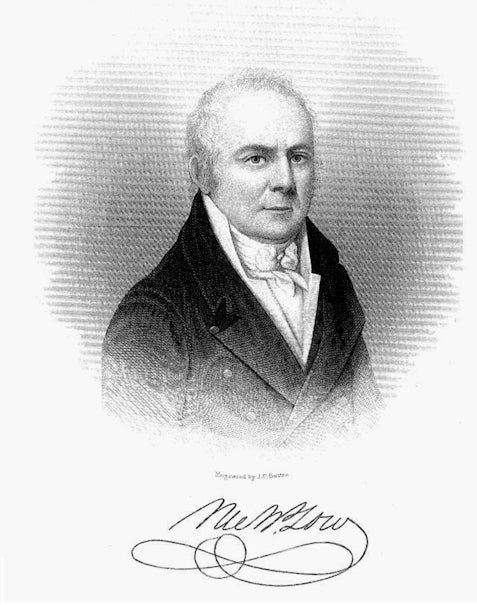
Nicholas Low, Revolutionary War Merchant, Legislator & Banker
Nicholas Low & Isaac Low: Brothers Divided by the American Revolution
The American Revolution was not just a conflict between Britain and its colonies—it was also a civil war within families, communities, and businesses. Few stories illustrate this divide better than that of Nicholas Low (1739–1826) and his brother, Isaac Low (1735–1791).
Nicholas Low was a prominent merchant, banker, and land speculator who became a strong supporter of the new American government, helping to build the country’s financial system. Isaac Low, on the other hand, started as a Patriot leader but later turned Loyalist, siding with the British and ultimately dying in exile.
Their story reflects the economic, political, and personal choices that shaped the early United States.
Early Life & Family Background
Nicholas and Isaac Low were born into an influential merchant family in New Jersey. Their father, Cornelius Low, Jr., was a successful trader, and their mother, Johanna Gouverneur Low, came from the prominent Gouverneur family, with deep connections in New York and New Jersey business circles.
Isaac Low: The Older Brother Who Became a Loyalist
Born in 1735, Isaac was the eldest and first to enter politics and business. By the 1760s, he was a leading merchant in New York, trading goods across the Atlantic. He was involved in colonial resistance to British taxation and helped found the New York Chamber of Commerce in 1768.
Nicholas Low: The Younger Brother Who Helped Build the New Nation
Born in 1739, Nicholas also entered the merchant business but focused on finance and land speculation.
Unlike Isaac, he became an early supporter of American independence and later worked with Alexander Hamilton and other Federalists to shape the new nation’s financial system.
Both brothers were well-respected figures in New York’s political and economic circles, but by 1776, they had taken opposite sides in the Revolution.
Isaac Low: From Patriot to Loyalist
Isaac Low started as a Patriot but later switched sides, making him one of the most notable Loyalists in New York.
Early Support for the Revolution (1765-1775)
1765 – He opposed British taxation and became a political leader in New York’s merchant community.
1774 – Elected delegate to the First Continental Congress, working alongside George Washington, John Adams, and Patrick Henry.
1775 – Isaac still hoped for a peaceful resolution and strongly opposed the push for full independence.
Betrayal & Arrest: Loyalist Shift (1776-1783)
As the Revolution progressed, Isaac became increasingly critical of the rebellion, fearing that it would lead to anarchy.
1777 – He was arrested and placed under house arrest by the New York Provincial Congress due to suspected Loyalist ties.
1783 – After the war, Isaac fled New York with the British Army, eventually settling in London, England, where he died in 1791, far from the country he once tried to shape.
Isaac’s story reflects the struggles faced by Loyalists—many of whom lost their property, businesses, and homes after the war. His exile symbolized the fall of New York’s Loyalist elite.
Nicholas Low: Merchant, Banker, and Federalist Leader
While Isaac lost everything as a Loyalist, Nicholas Low thrived in the new American government. He became a key player in finance, politics, and land development, helping to shape the early United States economy.
Merchant & Trade Career Before the Revolution
Nicholas ran the New York shipping firm Low & Wallace, which dealt in international trade. Unlike Isaac, he saw economic opportunity in breaking away from Britain, believing American merchants would thrive in an independent country.
Building America’s First Banks (1781-1790s)
After the Revolution, Nicholas focused on finance and banking, working alongside Alexander Hamilton and other Federalists.
1. 1781 – Bank of North America
Nicholas was one of the first shareholders of America’s first bank, created under the Articles of Confederation.
2. 1784 – Bank of New York
On March 15, 1784, he became one of 12 directors of the newly established Bank of New York, co-founded by Alexander Hamilton.
The bank played a key role in financing trade and stabilizing New York’s post-war economy.
3. 1790 – First Bank of the United States
As Hamilton pushed for a national banking system, Nicholas was named director of the New York branch of the First Bank of the United States. This was a crucial institution for stabilizing the young nation’s finances.
Political Influence & Federalist Leadership
Nicholas was not just a businessman—he was also an active Federalist politician, supporting a strong central government and financial system.
1787-1789 – Served in the New York State Assembly, helping shape early state legislation.
1788 – Attended New York’s Constitutional Ratification Convention, where he voted in favor of the U.S. Constitution, aligning with Hamilton and the Federalists.
1790-1823 – Managed the finances of Rufus King, a U.S. Senator, diplomat, and leading Federalist.
Nicholas Low’s financial and political influence helped solidify the foundation of America’s banking system and New York’s economic growth.
Land Speculation & Urban Development (1800-1826)
As New York expanded, Nicholas Low became one of its biggest land speculators.
1800-1826 – He invested heavily in New York City real estate and upstate New York, helping shape urban expansion. He bought and sold large tracts of land, financing the growth of early American cities and infrastructure.
His land deals mirrored those of other wealthy Federalists, who saw real estate as a major source of wealth in the young nation.
Legacy of the Low Brothers
The diverging paths of Nicholas and Isaac Low highlight the profound impact of the American Revolution on families and businesses.
Nicholas thrived in the new United States, becoming one of its financial architects, while Isaac’s Loyalist allegiance led to his downfall. Their story represents the choices and consequences of the Revolution—one brother embraced change and prosperity, while the other clung to loyalty and exile.
For further reading, check out their historical records:
Library of Congress – Nicholas Low Papers
New York Historical Society – Nicholas Low Archives
Isaac Low’s Loyalist Petition (1783): Library of Congress
Wikipedia – Nicholas Low